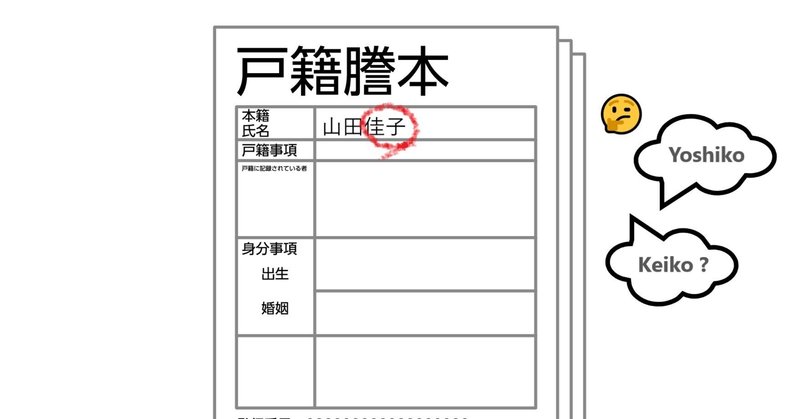
A Mystery of Japanese Names on Birth Certificates
Believe it or not, a birth certificate (family register, Koseki Tohon 戸籍謄本) in Japan does not tell you exactly what the person on the certificate is called.
This is due to the fact that most Japanese names are written in Chinese characters (Kanji 漢字), and there are multiple ways that Kanji can be read in Japanese.
E.g. 知子can read Tomoko, Kazuko, Satoko, Chiko, Chikako, to name but a few.
Nevertheless, the current family register only states names in Kanji (unless they are originally written in Kana 仮名, Japanese phonetic characters) and contains no information whatsoever on what the person is called. It's incredible, isn't it?
To complicate matters even further, some Japanese names can also be transcribed in various ways using Latin scripts. Previously, all Japanese had to have their names transcribed in alphabets according to the Hepburn romanisation method (ヘボン式ローマ字) for their passports. But the system has a fatal error. It does not make any distinction between prolonged (長音) and non-prolonged sounds.
E.g. 小野 (Ono) and 大野 (Ohno) come out the same in the Hepburn writing system. Kanji for “Small” (小) is transcribed as “O”, while Kanji for “Large” (大) is also “O”.
Following the reform of the relevant legislation in 2008, however, the 大野 clan can now choose to spell their family name as “Ohno” or “Oono” on passports.
This is all relevant when it comes to translating family registers. Especially so if their #translations need to be certified. All we can do as translators is to ask clients what they are called, and if necessary how their names are spelt on their passports.
Well, a change is in sight now.
The relevant act related to the Family Registration Act was enacted last year and will be implemented as of May 2025. Within one year of that date, all family registers will be expected to include information on the pronunciation of names.
This must be a move by the Japanese government to ride on the wave of digitization using the infamous National Identification No. called My Number (マイナンバー).
Future family registers should ease the task of translators who have had a hard time up to now figuring out personal names.
On the other hand, I can imagine that it will be no easy task to put this law into practice. All Japanese nationals, including those residing overseas like me, are supposed to report their names in phonetic characters (読み仮名) to their respective town halls. If you fail to report, the municipality can decide (!) on the transcription of your name, so I read. In theory, Kazuko (知子) can suddenly become Tomoko on her birth certificate.
How will that work?! The numerous scandals related to “My Number” are not a distant memory. Well, we’ll see.
Anyway, all family registers in Japanese – either with or without name transcriptions – can be properly translated into #German at our office. We work with reliable colleagues holding national qualifications as sworn translators for #Japanese and #German languages.
👉 Need #certified #translation for your marriage in Germany? Simply get in touch with me for a free quote!
この記事が気に入ったらサポートをしてみませんか?
